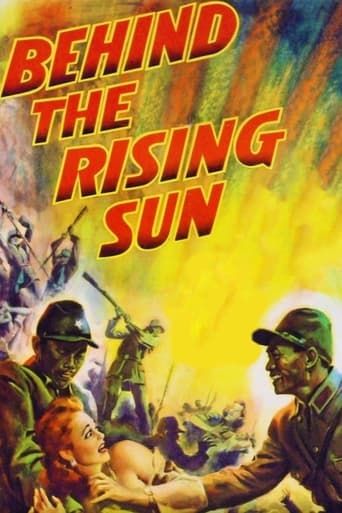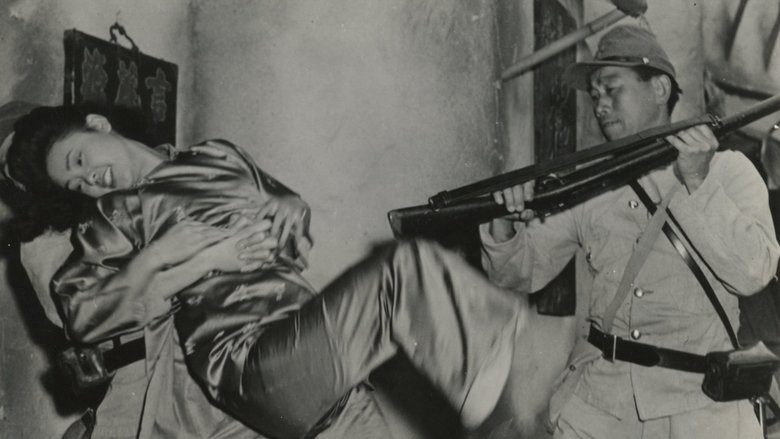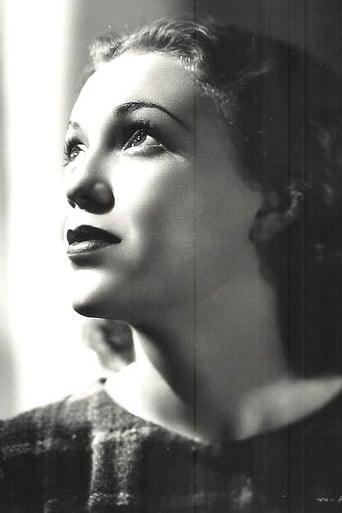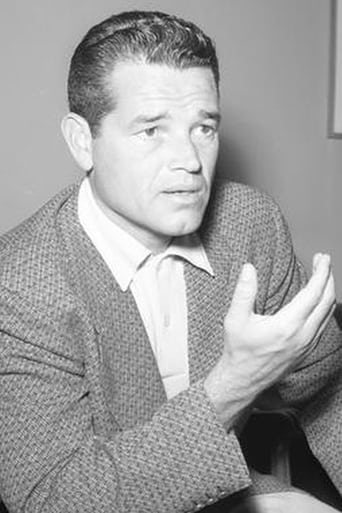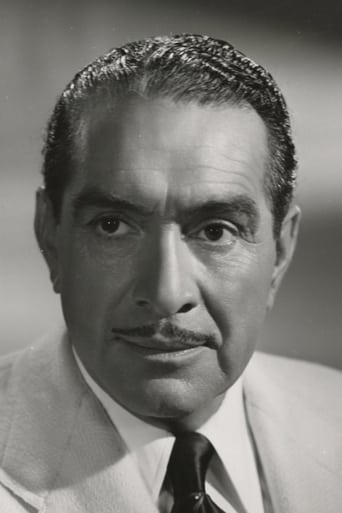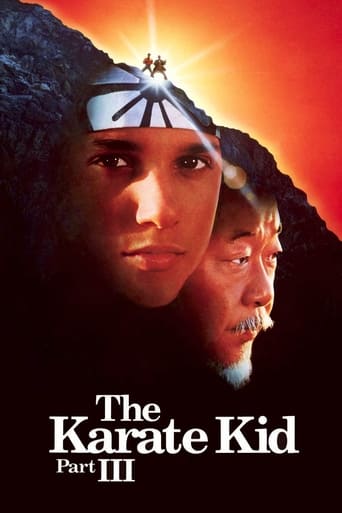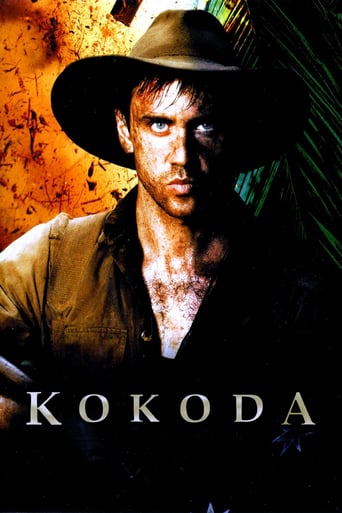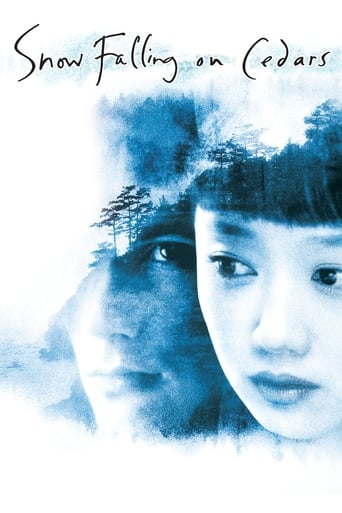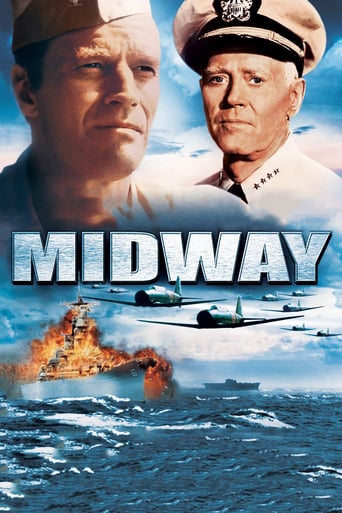Behind the Rising Sun (1943)
A Japanese publisher urges his American-educated son to side with the Axis.
Watch Trailer
Cast


Similar titles
Reviews
Powerful
Although I seem to have had higher expectations than I thought, the movie is super entertaining.
It is an exhilarating, distressing, funny and profound film, with one of the more memorable film scores in years,
An old-fashioned movie made with new-fashioned finesse.
... and to talk about them in any sympathetic way whatsoever. Taro Seki(Tom Neal), a happy go lucky kid, returns to Japan after finishing his degree in engineering in America. His father, Reo (J Carrol Naish) is a VIP in the government. Now it did seem a bit much that Taro would greet his dad after only four years in the U.S. with the 1940's version of "Hi daddy-O how's it hanging? I'm just swell!", but I guess the writers had to quickly show how much he had bought into the American dream and planned on living it in Japan. Taro goes to business man Clancy OHara (Donald Douglas) for an engineering job, gets one, and meets Tama (Margo), Clancys secretary. They begin seeing each other and decide to marry, but Taro is drafted into the Japanese army and is shipped off to China. All the while, Taro's father is disapproving of Taro marrying someone he considers to be a commoner, although he has nothing personal against the girl. There is a sideplot of the European and Americans living in Japan. American journalist Sara practically proposes to Clancy, but you can tell he is scared stiff of the idea of marriage even though he enjoys Sara's company. Sara feels rebuffed, and goes off to report in China on the Japanese occupation for years. Occasionally she runs into Taro, who becomes increasingly hardened to the violence around him. Then Taro finally returns to Japan. And then December 7,1941 rolls around with his American friends still there, where things soon become very unpleasant.The war was still on when this was made, so naturally Japanese actors couldn't have taken these parts even if they had wanted to take them. It does a good job of showing how traditions that had held fast in Japan for centuries - loyalty to family, belief in the emporer, the high esteem given to the military, could warp into something that becomes a killing machine under the right circumstances and the wrong leaders. I'd recommend it if you ever get a chance. It isn't as preachy as many films made during WWII about WWII.
Although some very interesting things were said in it, in the final analysis Behind The Rising Sun was more propaganda than truth to it. It was also insulting and in fact a couple of things might have gotten director Edward Dmytryk membership in the Hollywood 10.J. Carrol Naish and Tom Neal with Oriental makeup on them play father and son. Naish a member of the rising new business class in Japan can afford to send Neal to Cornell in America. He comes back sporting new hep cat idioms of expression.The film tries for some verisimilitude as Naish says that Japan is about to take its place in the world, that the white man is not a majority by any means in the world. Neal doesn't quite to make of his dad's militance but drinks it in far more than he realizes then. That bit of dialog I'm sure got noticed by the folks at House Un American Activities Committee headed around then by Mississippi racist John Rankin.Later on the roles reverse as Naish decides his country has become to fascist with its Samurai based code of military behavior. Japan is the great example always held up by historians about the need for civilian control of the military. By then Neal is a true believer in the destiny of Japan.Another thing that got HUAC's attention was George Givot playing the Russian journalist who becomes friend and benefactor to Americans caught in Japan after Pearl Harbor. A friendly portrayal of a Communist would certainly do the trick with the HUAC thought police.At one point Neal and former employer engineer Don Douglas have a nasty confrontation and decide to settle it with seconds. Neal gets wrestler Mike Mazurki who excels in Judo. Douglas gets his friend Robert Ryan to go in for him. In real life Mazurki was a wrestler before turning to acting and being really good at it. Ditto for Ryan who did box as an amateur and both look like they know what they're doing. Both go into the ring using their arts. Ryan and Mazurki must have had one good laugh over it because the heavier and very agile Mazurki would have killed Ryan.A couple of other key roles are Dorothy Thompson like reporter Gloria Holden and Margo playing the girl Neal wants to marry. Her heart is truly broken.Behind The Rising Sun had some serious things to say, but in the end with that insulting makeup just doesn't hold up today.
Considering that this is blatant propaganda basically it is to Japan what "Hitler's Children" is to Germany, and from the same director it's a somewhat difficult film to evaluate today. I end up going on the negative side I really don't think that for anyone other than people like myself who are interested in propaganda as a subject that there is very much of value in this film at this point. But I do think that for war-time American audiences it wasn't a rip-off; it did provide a varied entertainment vehicle with surprising elements like a young Robert Ryan boxing against a Sumo wrestler and a fairly interesting love story between the secondary American characters (Gloria Holden and Donald Douglas).The most striking thing about this movie is how hard it strives like "Children" to establish the humanity of the Japanese characters before showing how fascist systems of thought dehumanize them and make them capable of doing unimaginable deeds (this film implies that babies are being thrown into some kind of pit and shows children being separated from their mothers so the Japanese army can have their way with them). Unfortunately this effect is greatly damaged by having non-Japanese actors for all the major roles. This isn't a practice that I think deserves the kind of blanket-condemnation that it's received lately. I don't think it's inherently racist to have an actor portray a role that's not of their racial type Lon Chaney's appearance in "Shadows" is no more racist for example than Denzel Washington's appearance in "Much Ado About Nothing." We should not dismiss the artistic validity of a performance simply because the actor is playing outside his native racial heritage to do so is far too limiting for actors and shows a lack of imagination on the part of audiences. But in this case I just feel that given how sensitive the material is Japan's atrocities in China and the Pearl Harbor bombing, for example it would be highly preferable to have actual Asian-American actors in the roles. And I think this would even have strengthened the film's function as propaganda at the time of its release both here and abroad. And the final nail in the coffin is the fact that they picked Tom Neal ("Detour"), an unimpressive actor with no screen presence and a distinctly European face that simply defies all putty and paint and never convinces. Usually in these kind of films I start to ignore the racial difference regardless of how European the actor looks for instance Boris Karloff was convincing in "West of Shanghai." But Neal is not a good enough actor to make us want to forget that he's playing outside his racial type because he's also playing outside of the range of his talent. J. Carrol Naish shows how it's done his performance as the father, Reo Seki, is very subtle and accomplished and we stop thinking about any racial difference within minutes because of the skill with which he fills out the role. So there's a strong contrast here within this movie that really damages whatever is left of its dramatic strength. But it really would have helped as well if they had selected an actor for Taro Seki who had a somewhat less distinctive face without quite as strong a jaw as Neal.I did think it was pretty surprising that the narrative so completely abandoned Taro Seki (Neal) I kind of kept expecting it to make a hero out of him again in the end somehow. Instead the film shifts to the point where Reo Seki is someone we can relate to more than the son who seems to be so American at the beginning of the film. So the movie benefits by not being as predictable as it could have been. It really allows Japanese culture to emerge with some dignity. Too bad they felt they had to fill it with absurd elements. For example in one scene when Japan declares war on China, a man with a rather comical but somehow scary Asian face (Paul Fung, apparently) jumps out and the American characters say something like "oh no, it's the Samurai Sword dance!" just as he starts to twirl and pounce ridiculously around the room. In another scene Japanese soldiers hand out opium to small Chinese children instead of bread.It would be really fantastic if the movie actually was what it appears to be an exploration of how good people become evil people under the influence of fascist ideology. Some of the early scenes like the one where Taro Seki takes his girlfriend (Margo) to a baseball game that's interrupted by military drills and an instruction that "everything you see on the field should be viewed as military preparation", seemed to promise such a movie. But in reality it's a bit more ambitious than it probably should have been in terms of humanizing the Japanese, producing a film that from today's eyes (at least, mine) appears even more bizarre than some of the more one-sided propaganda films from the period simply because it's trying to do so much but then betrays that attempt whenever necessary or even perhaps convenient. The director, Dmytyrk, actually got in trouble later on in the 50s for some of the things he did in these films and in some of the films he made after the War ended. In this film for example we have a sympathetic Communist figure in "Boris" (George Givot). Dmytryk always had big ideas but his style of directing is very straightforward and in this particular film there's not much personality to distinguish it from your run of the mill B propaganda picture, except perhaps the attention that's been paid as I said above to keeping the humanity of the Japanese front and center, and this goes for both negative and positive portrayals of the characters.
Today (even in 1943) this film is very racist dealing with Japanese son educated in US goes back to Japan and takes part in atrocities there and in China. The whole China sequences are very grisly and actually disturbing, such as nailing the baby to the door by his/her pigtail along with the usual raping and pillaging of the Chinese countryside. They even keep the Chinese drugged up with free heroin handouts from trucks that pull into the villages. There is just one "good" Japanese character in the movie, the female secretary who works for an American architect caught in Japan with some Western reporters when WW2 finally erupts. But then these characters get tortured and sentenced to death. On the whole film it is NEVER boring...never. It has very good production and fine actors (even though Japanese are all played by white Europeans a la Charlie Chan). Now get this! RKO was asked by US government to make a picture that would portray Japanese in a real and fair way instead of the crop of anti-Japanese pictures that were made already so to stave off racial hatred toward this group. It was rampant in US (not so, for Germans though, interestingly films about Nazi's always had numerous "good" Germans, never in propaganda Japanese films who were usually portrayed as sub human hordes.)Anyway this was Hollywood's answer to the problem. Unbelievable! Film though is considered an excellent yet hysterical example of WW2 propaganda at the time.

